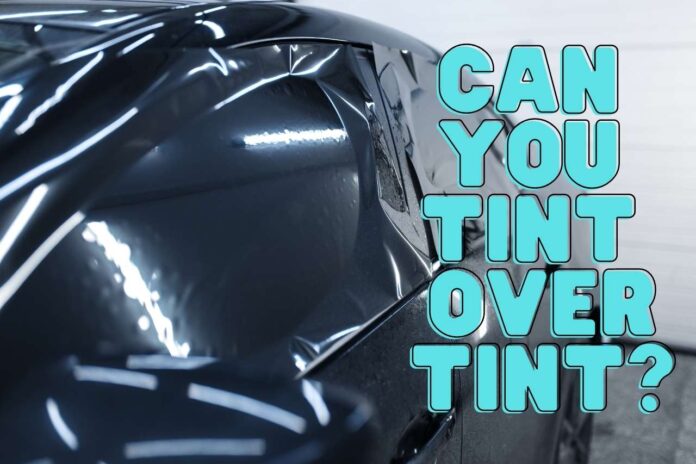Window tinting, in the automotive industry, is one of the projects that upgrade your car in many ways, ensuring the journey is comfortable and secure. If you have tinted your vehicle windows, there are still a few adjustments you will want to make to make out the best version and increase its quality. Thus, you might also wonder whether you can you tint over tint. The answer to this may vary to each person with their experience depending on the method used, tint over tint, and the condition of the previous tint.
An individual might consider tinting over tint if their previous tint is damaged or if they want to increase the benefits of it. But, people are unsure whether they can tint over tint because sometimes it could worsen the situation or bring the best.
Can You Tint Over Tint?
Tinting over tint cannot be an issue because it is normal to tint the windows over the factory tint. But if you are planning to tint the windows over an aftermarket tint, which is different than the factory tint. In that case, you must expect few drawbacks because the factory is the tint when the glass itself is colored, and the aftermarket tint when a separate film sheet is installed to the glass.
Before you know if you can tint over an aftermarket tint, you must also ensure you know the result of it. Because doubling the tint means, the windows are going to get darker. In some states, there is a percentage you cannot exceed the darkness in your tints because it reduces the visibility range at night and jeopardize you. Thus, before you tint over a tint, consider your country’s rules.
Is Tinting Over Tint Bad?
As previously stated, tinting over factory tint will not be an issue, but if you are tinting over an aftermarket tint, you must expect some drawbacks. But if you can tint the right way by following a few steps, there are also possibilities for the process to get successful.
If not; the new coat of tint will form air bubbles and give your car a very unpleasant look. Avoid tinting over aftermarket tint at your best, especially if the aftermarket tint is peeled or formed air bubbles.
It is recommended to consult a professional before tinting your car because their experience in the industry will help to keep you on the safe side and recommend the best type of tint for your windows.
What Benefits of Tinting Over Tint?
Tinting windows is an upgrade to the car; you benefit in many ways, and it gives you a comfortable and safe journey. Thus, tinting over a tint the right way simultaneously doubles your tint’s benefits; by tinting over tint, you can expect a premium feel while traveling in the car.
Below is a brief insight into the benefits of tinting over tinting your car windows.
- It reduces the heat entering your vehicle and maintains a cool atmosphere inside the car.
- Doubles the strength of your car by minimizing the damage to the glass during an accident.
- The high tint percentage increases the privacy of the passengers by making it almost impossible to see through the glass.
- Doubles the protection against UV (Ultra Violet) radiation, protecting you from the possible health issue caused by exposure to sunlight.
- Increases the lifetime of the tint because there are fewer chances for the tint to accelerate.
What to Do After Installing the Tint?
After installing your tint, you must be extremely careful till the tint is healed. Not following proper measurements after a fresh tint will be a huge turndown on your investment. Thus you must take and follow the steps to avoid disappointments. Below are a few you can follow after installing new tints.
- Allow the tint to heal for nearly 48 hours, don’t roll the windows down, as it could cause damage to the corners and reduce the tint’s lifetime. Leave the windows rolled up for at least two days on a summer day.
- Avoid washing your windows with harsh chemicals, and wipe the glasses dry with a soft cotton cloth. Leaving a water residue will weaken the tint.
- Use a light foam cleanser to clean the windows and completely dry the tint.
- Do not meddle with the water pockets or air bubbles formed in the tint because it is quiet in newly installed tints. The air bubbles and water pockets will leave once the tint is completely healed and ready to use.
How to Remove Window Tint?
Removing the window tints is not an as tedious job as much as installing tints, but you ensure to remove the tint without damaging the glass window. Adhering to safety rules when removing the tint is crucial to avoid personal injuries as you will be handling sharp objects.
To remove the window tint, use a razor blade, and cut around the corners of the windows. Try to avoid scratching the windows and only focus on the laminated sheet.
Next, start peeling off the tint from the edges using the tip of your fingers. If the adhesive is too hard, use a hair dryer to loosen the adhesive. After taking off the sheet, peel off the remaining using a razor or a blade. Now using a glass cleaner wash your windows and dry them thoroughly using a fiber cloth.
Conclusion
If you want to double the benefits of your tint but tinting over tint, it depends on the type of tint on your window glasses. Tinting over an aftermarket tint is not recommended, but you can tint over a factory tint to get the desired results. But it is also important to consider the rules because the law does not allow you to exceed a specific percentage of darkness in your tints.
Check Out This Video,
VIDEO CREDITS: Tint Studio YouTube Channel
Don’t Stop Here: Explore More Related Content

